VLE Impact on Learning Experience of Students at UWTSD London
VerifiedAdded on 2023/06/15
|15
|3023
|220
Report
AI Summary
This report investigates the impact of Virtual Learning Environments (VLE) on the learning experiences of students at the University of Wales Trinity Saint David (UWTSD) London Campus. It explores the concept of virtual learning, its challenges, and its critical impacts, both positive and negative, on student performance. The research employs a qualitative approach, utilizing questionnaires to gather primary data and thematic analysis to interpret the findings. The results indicate that while most students have knowledge of VLE and use it frequently, technical issues and varying levels of agreement on the effectiveness of platforms like MOODLE exist. The report concludes with recommendations for tutors to improve the virtual learning experience, such as utilizing chat functions for answering questions and conducting feedback sessions. It emphasizes the importance of addressing challenges associated with VLE to enhance student learning outcomes. Desklib offers a range of resources, including solved assignments and past papers, to support students in their academic endeavors.
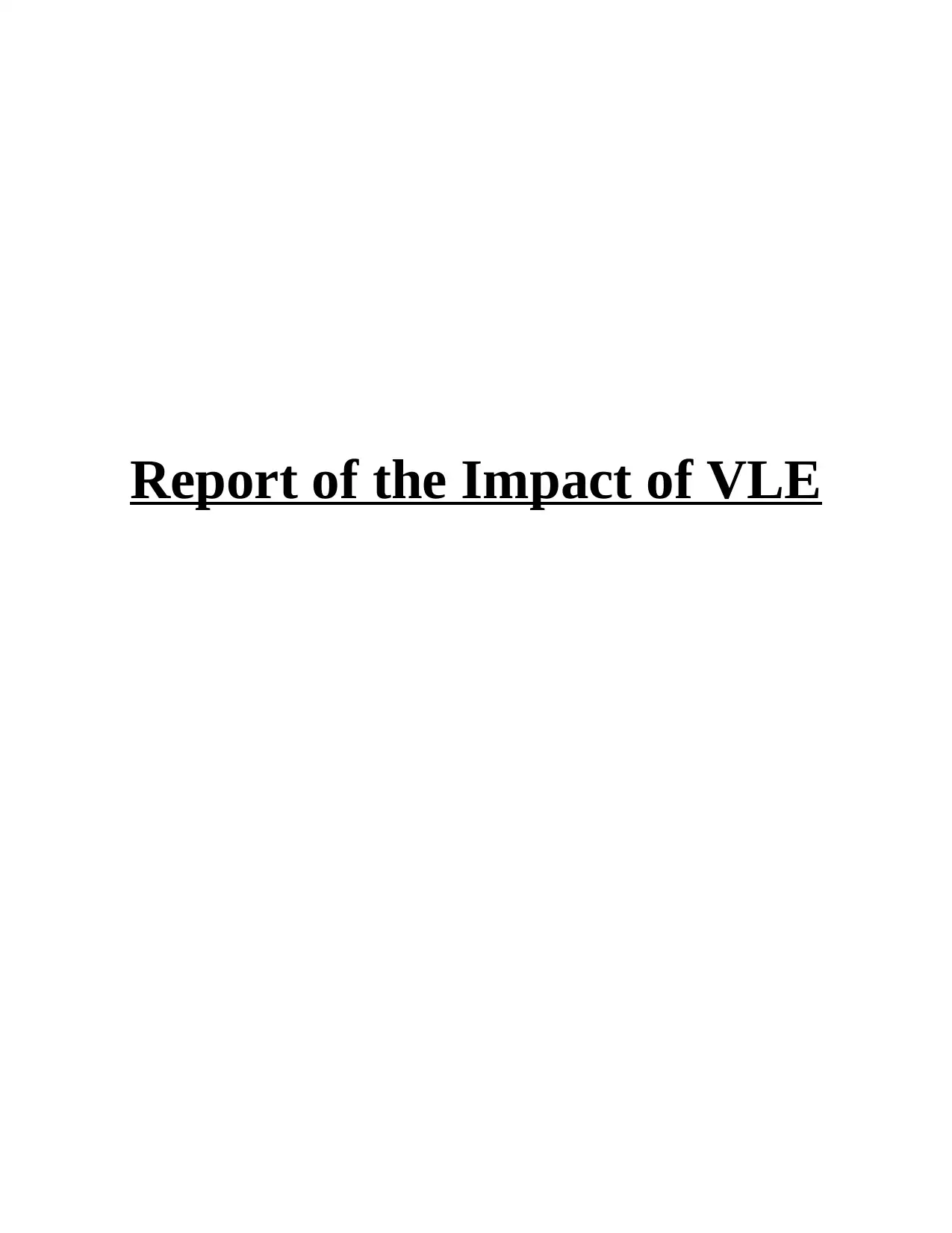
Report of the Impact of VLE
Paraphrase This Document
Need a fresh take? Get an instant paraphrase of this document with our AI Paraphraser
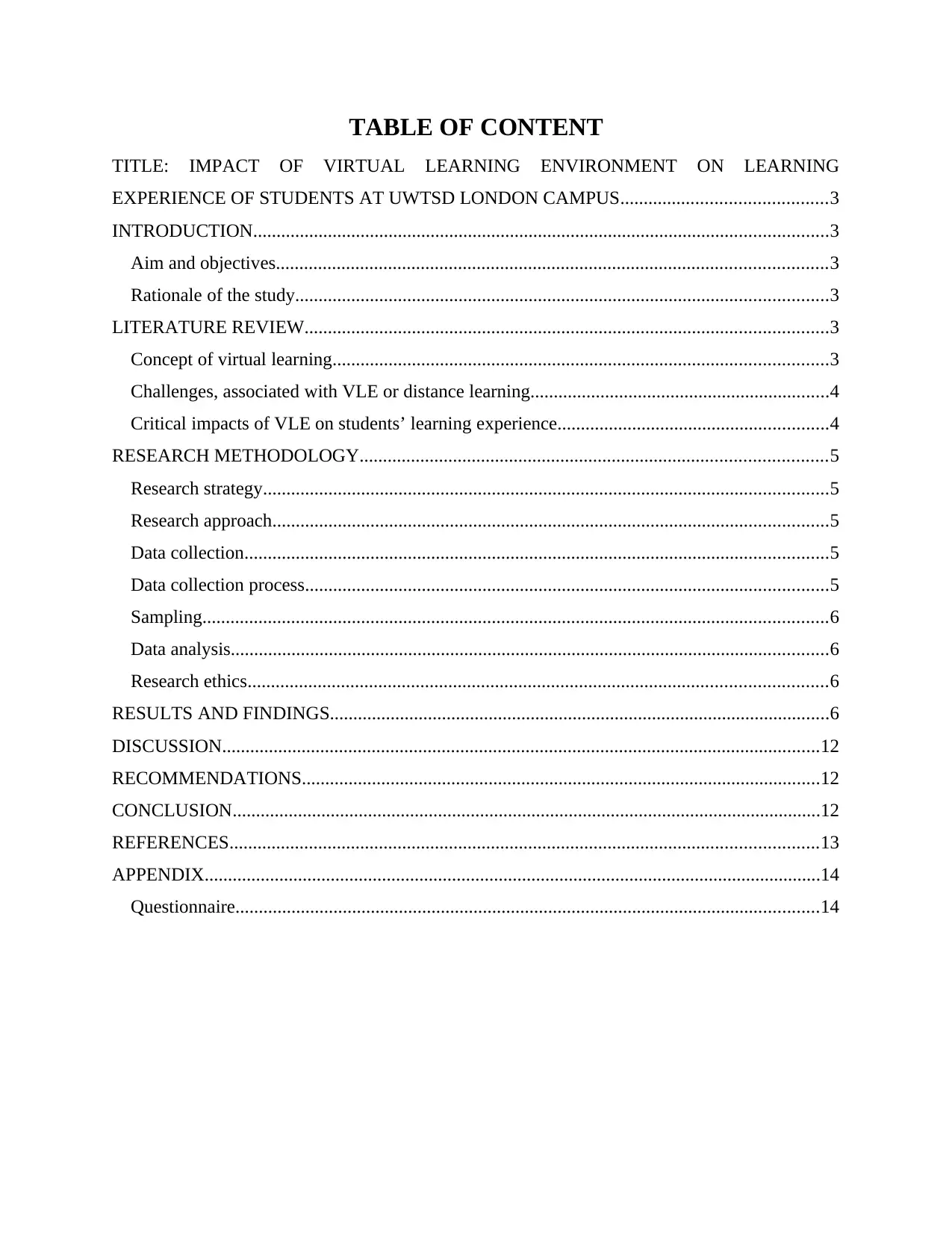
TABLE OF CONTENT
TITLE: IMPACT OF VIRTUAL LEARNING ENVIRONMENT ON LEARNING
EXPERIENCE OF STUDENTS AT UWTSD LONDON CAMPUS............................................3
INTRODUCTION...........................................................................................................................3
Aim and objectives......................................................................................................................3
Rationale of the study..................................................................................................................3
LITERATURE REVIEW................................................................................................................3
Concept of virtual learning..........................................................................................................3
Challenges, associated with VLE or distance learning................................................................4
Critical impacts of VLE on students’ learning experience..........................................................4
RESEARCH METHODOLOGY....................................................................................................5
Research strategy.........................................................................................................................5
Research approach.......................................................................................................................5
Data collection.............................................................................................................................5
Data collection process................................................................................................................5
Sampling......................................................................................................................................6
Data analysis................................................................................................................................6
Research ethics............................................................................................................................6
RESULTS AND FINDINGS...........................................................................................................6
DISCUSSION................................................................................................................................12
RECOMMENDATIONS...............................................................................................................12
CONCLUSION..............................................................................................................................12
REFERENCES..............................................................................................................................13
APPENDIX....................................................................................................................................14
Questionnaire.............................................................................................................................14
TITLE: IMPACT OF VIRTUAL LEARNING ENVIRONMENT ON LEARNING
EXPERIENCE OF STUDENTS AT UWTSD LONDON CAMPUS............................................3
INTRODUCTION...........................................................................................................................3
Aim and objectives......................................................................................................................3
Rationale of the study..................................................................................................................3
LITERATURE REVIEW................................................................................................................3
Concept of virtual learning..........................................................................................................3
Challenges, associated with VLE or distance learning................................................................4
Critical impacts of VLE on students’ learning experience..........................................................4
RESEARCH METHODOLOGY....................................................................................................5
Research strategy.........................................................................................................................5
Research approach.......................................................................................................................5
Data collection.............................................................................................................................5
Data collection process................................................................................................................5
Sampling......................................................................................................................................6
Data analysis................................................................................................................................6
Research ethics............................................................................................................................6
RESULTS AND FINDINGS...........................................................................................................6
DISCUSSION................................................................................................................................12
RECOMMENDATIONS...............................................................................................................12
CONCLUSION..............................................................................................................................12
REFERENCES..............................................................................................................................13
APPENDIX....................................................................................................................................14
Questionnaire.............................................................................................................................14
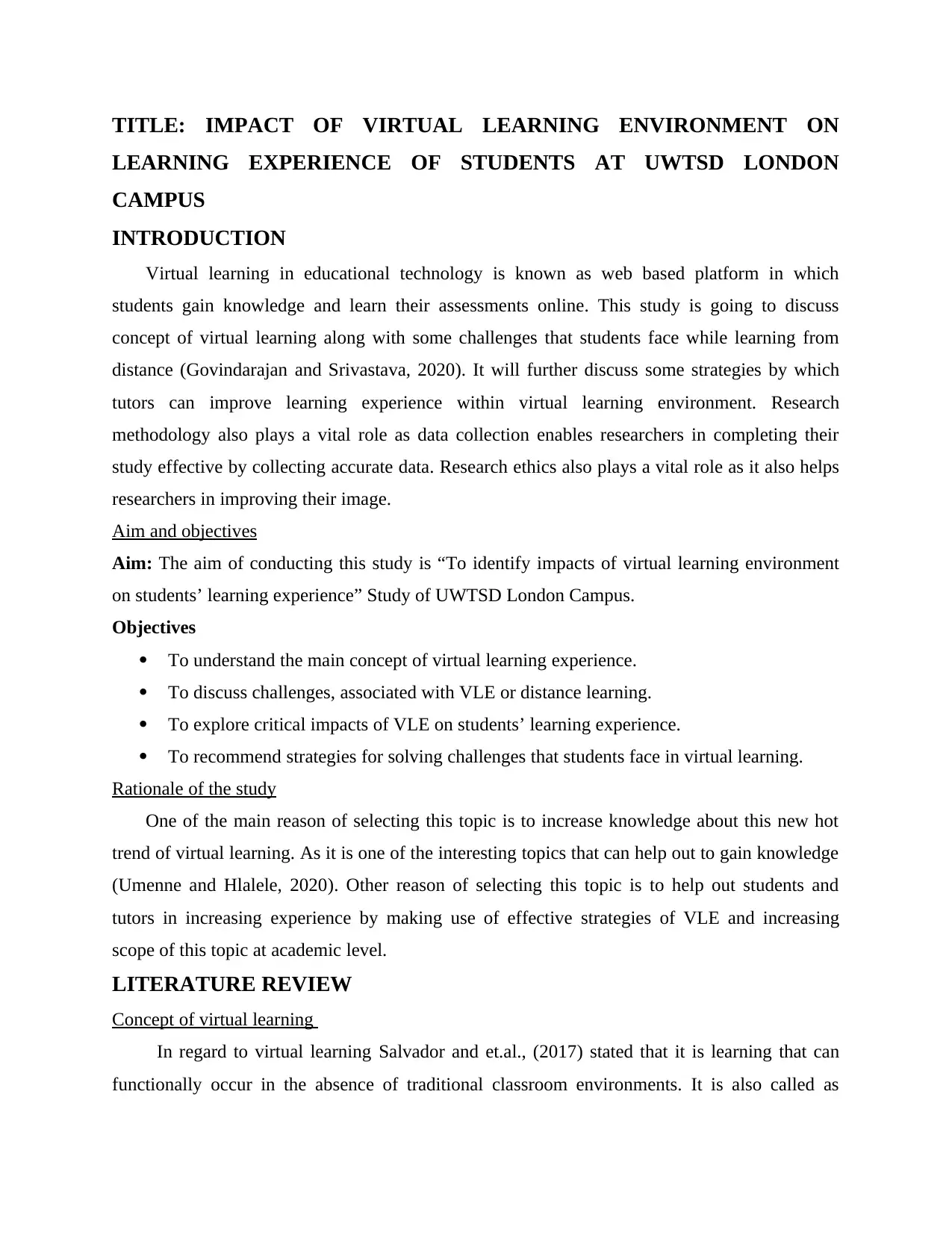
TITLE: IMPACT OF VIRTUAL LEARNING ENVIRONMENT ON
LEARNING EXPERIENCE OF STUDENTS AT UWTSD LONDON
CAMPUS
INTRODUCTION
Virtual learning in educational technology is known as web based platform in which
students gain knowledge and learn their assessments online. This study is going to discuss
concept of virtual learning along with some challenges that students face while learning from
distance (Govindarajan and Srivastava, 2020). It will further discuss some strategies by which
tutors can improve learning experience within virtual learning environment. Research
methodology also plays a vital role as data collection enables researchers in completing their
study effective by collecting accurate data. Research ethics also plays a vital role as it also helps
researchers in improving their image.
Aim and objectives
Aim: The aim of conducting this study is “To identify impacts of virtual learning environment
on students’ learning experience” Study of UWTSD London Campus.
Objectives
To understand the main concept of virtual learning experience.
To discuss challenges, associated with VLE or distance learning.
To explore critical impacts of VLE on students’ learning experience.
To recommend strategies for solving challenges that students face in virtual learning.
Rationale of the study
One of the main reason of selecting this topic is to increase knowledge about this new hot
trend of virtual learning. As it is one of the interesting topics that can help out to gain knowledge
(Umenne and Hlalele, 2020). Other reason of selecting this topic is to help out students and
tutors in increasing experience by making use of effective strategies of VLE and increasing
scope of this topic at academic level.
LITERATURE REVIEW
Concept of virtual learning
In regard to virtual learning Salvador and et.al., (2017) stated that it is learning that can
functionally occur in the absence of traditional classroom environments. It is also called as
LEARNING EXPERIENCE OF STUDENTS AT UWTSD LONDON
CAMPUS
INTRODUCTION
Virtual learning in educational technology is known as web based platform in which
students gain knowledge and learn their assessments online. This study is going to discuss
concept of virtual learning along with some challenges that students face while learning from
distance (Govindarajan and Srivastava, 2020). It will further discuss some strategies by which
tutors can improve learning experience within virtual learning environment. Research
methodology also plays a vital role as data collection enables researchers in completing their
study effective by collecting accurate data. Research ethics also plays a vital role as it also helps
researchers in improving their image.
Aim and objectives
Aim: The aim of conducting this study is “To identify impacts of virtual learning environment
on students’ learning experience” Study of UWTSD London Campus.
Objectives
To understand the main concept of virtual learning experience.
To discuss challenges, associated with VLE or distance learning.
To explore critical impacts of VLE on students’ learning experience.
To recommend strategies for solving challenges that students face in virtual learning.
Rationale of the study
One of the main reason of selecting this topic is to increase knowledge about this new hot
trend of virtual learning. As it is one of the interesting topics that can help out to gain knowledge
(Umenne and Hlalele, 2020). Other reason of selecting this topic is to help out students and
tutors in increasing experience by making use of effective strategies of VLE and increasing
scope of this topic at academic level.
LITERATURE REVIEW
Concept of virtual learning
In regard to virtual learning Salvador and et.al., (2017) stated that it is learning that can
functionally occur in the absence of traditional classroom environments. It is also called as
⊘ This is a preview!⊘
Do you want full access?
Subscribe today to unlock all pages.

Trusted by 1+ million students worldwide
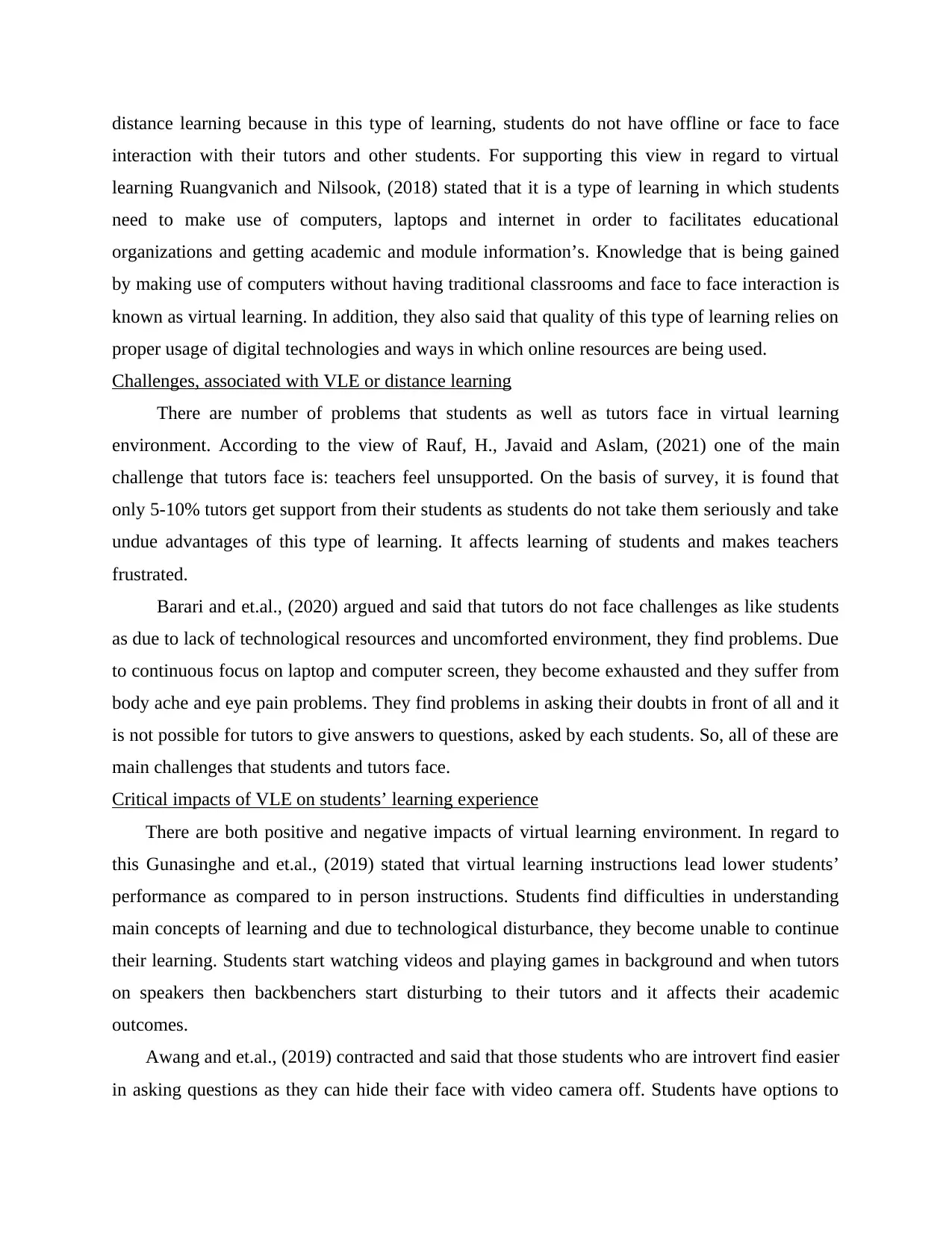
distance learning because in this type of learning, students do not have offline or face to face
interaction with their tutors and other students. For supporting this view in regard to virtual
learning Ruangvanich and Nilsook, (2018) stated that it is a type of learning in which students
need to make use of computers, laptops and internet in order to facilitates educational
organizations and getting academic and module information’s. Knowledge that is being gained
by making use of computers without having traditional classrooms and face to face interaction is
known as virtual learning. In addition, they also said that quality of this type of learning relies on
proper usage of digital technologies and ways in which online resources are being used.
Challenges, associated with VLE or distance learning
There are number of problems that students as well as tutors face in virtual learning
environment. According to the view of Rauf, H., Javaid and Aslam, (2021) one of the main
challenge that tutors face is: teachers feel unsupported. On the basis of survey, it is found that
only 5-10% tutors get support from their students as students do not take them seriously and take
undue advantages of this type of learning. It affects learning of students and makes teachers
frustrated.
Barari and et.al., (2020) argued and said that tutors do not face challenges as like students
as due to lack of technological resources and uncomforted environment, they find problems. Due
to continuous focus on laptop and computer screen, they become exhausted and they suffer from
body ache and eye pain problems. They find problems in asking their doubts in front of all and it
is not possible for tutors to give answers to questions, asked by each students. So, all of these are
main challenges that students and tutors face.
Critical impacts of VLE on students’ learning experience
There are both positive and negative impacts of virtual learning environment. In regard to
this Gunasinghe and et.al., (2019) stated that virtual learning instructions lead lower students’
performance as compared to in person instructions. Students find difficulties in understanding
main concepts of learning and due to technological disturbance, they become unable to continue
their learning. Students start watching videos and playing games in background and when tutors
on speakers then backbenchers start disturbing to their tutors and it affects their academic
outcomes.
Awang and et.al., (2019) contracted and said that those students who are introvert find easier
in asking questions as they can hide their face with video camera off. Students have options to
interaction with their tutors and other students. For supporting this view in regard to virtual
learning Ruangvanich and Nilsook, (2018) stated that it is a type of learning in which students
need to make use of computers, laptops and internet in order to facilitates educational
organizations and getting academic and module information’s. Knowledge that is being gained
by making use of computers without having traditional classrooms and face to face interaction is
known as virtual learning. In addition, they also said that quality of this type of learning relies on
proper usage of digital technologies and ways in which online resources are being used.
Challenges, associated with VLE or distance learning
There are number of problems that students as well as tutors face in virtual learning
environment. According to the view of Rauf, H., Javaid and Aslam, (2021) one of the main
challenge that tutors face is: teachers feel unsupported. On the basis of survey, it is found that
only 5-10% tutors get support from their students as students do not take them seriously and take
undue advantages of this type of learning. It affects learning of students and makes teachers
frustrated.
Barari and et.al., (2020) argued and said that tutors do not face challenges as like students
as due to lack of technological resources and uncomforted environment, they find problems. Due
to continuous focus on laptop and computer screen, they become exhausted and they suffer from
body ache and eye pain problems. They find problems in asking their doubts in front of all and it
is not possible for tutors to give answers to questions, asked by each students. So, all of these are
main challenges that students and tutors face.
Critical impacts of VLE on students’ learning experience
There are both positive and negative impacts of virtual learning environment. In regard to
this Gunasinghe and et.al., (2019) stated that virtual learning instructions lead lower students’
performance as compared to in person instructions. Students find difficulties in understanding
main concepts of learning and due to technological disturbance, they become unable to continue
their learning. Students start watching videos and playing games in background and when tutors
on speakers then backbenchers start disturbing to their tutors and it affects their academic
outcomes.
Awang and et.al., (2019) contracted and said that those students who are introvert find easier
in asking questions as they can hide their face with video camera off. Students have options to
Paraphrase This Document
Need a fresh take? Get an instant paraphrase of this document with our AI Paraphraser
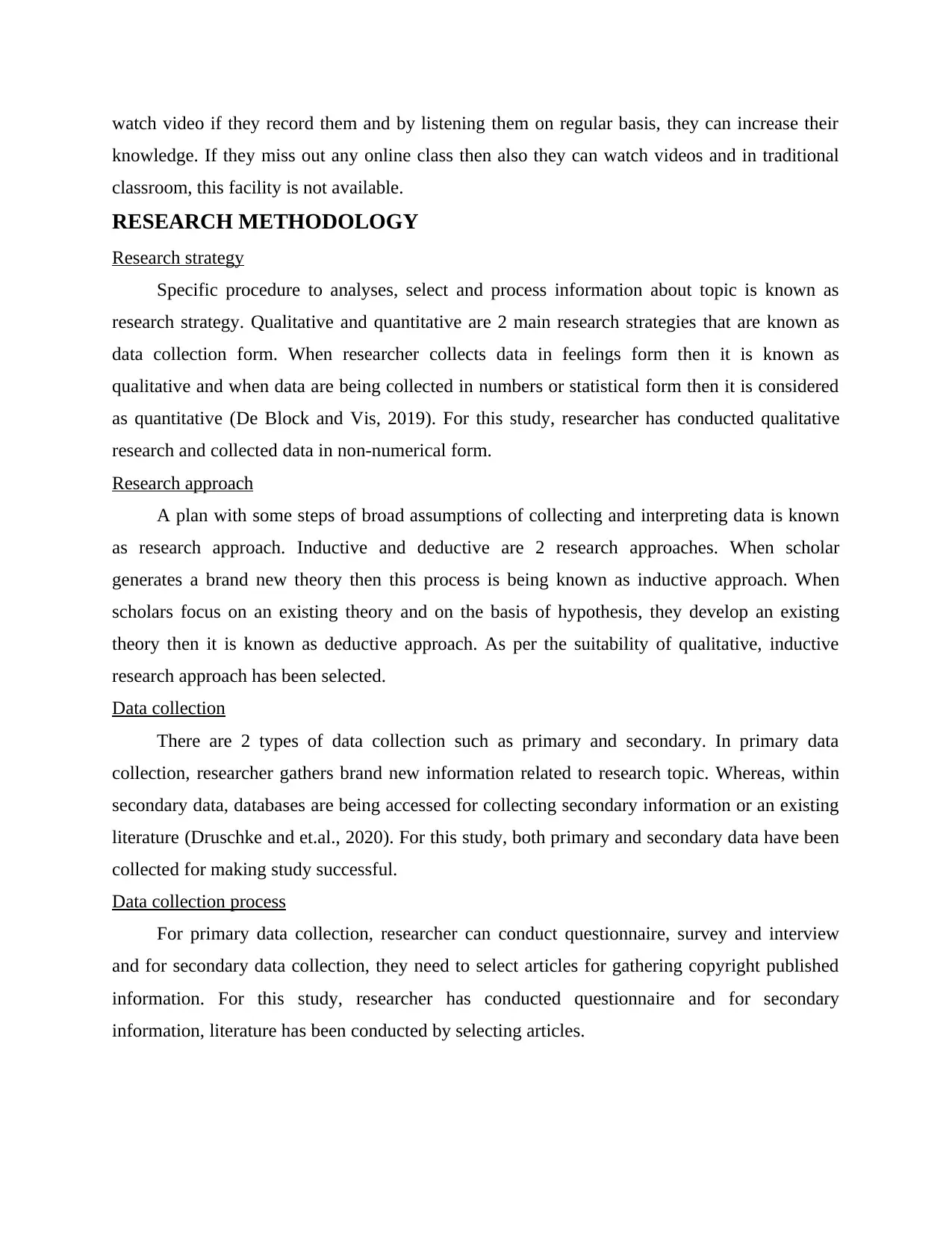
watch video if they record them and by listening them on regular basis, they can increase their
knowledge. If they miss out any online class then also they can watch videos and in traditional
classroom, this facility is not available.
RESEARCH METHODOLOGY
Research strategy
Specific procedure to analyses, select and process information about topic is known as
research strategy. Qualitative and quantitative are 2 main research strategies that are known as
data collection form. When researcher collects data in feelings form then it is known as
qualitative and when data are being collected in numbers or statistical form then it is considered
as quantitative (De Block and Vis, 2019). For this study, researcher has conducted qualitative
research and collected data in non-numerical form.
Research approach
A plan with some steps of broad assumptions of collecting and interpreting data is known
as research approach. Inductive and deductive are 2 research approaches. When scholar
generates a brand new theory then this process is being known as inductive approach. When
scholars focus on an existing theory and on the basis of hypothesis, they develop an existing
theory then it is known as deductive approach. As per the suitability of qualitative, inductive
research approach has been selected.
Data collection
There are 2 types of data collection such as primary and secondary. In primary data
collection, researcher gathers brand new information related to research topic. Whereas, within
secondary data, databases are being accessed for collecting secondary information or an existing
literature (Druschke and et.al., 2020). For this study, both primary and secondary data have been
collected for making study successful.
Data collection process
For primary data collection, researcher can conduct questionnaire, survey and interview
and for secondary data collection, they need to select articles for gathering copyright published
information. For this study, researcher has conducted questionnaire and for secondary
information, literature has been conducted by selecting articles.
knowledge. If they miss out any online class then also they can watch videos and in traditional
classroom, this facility is not available.
RESEARCH METHODOLOGY
Research strategy
Specific procedure to analyses, select and process information about topic is known as
research strategy. Qualitative and quantitative are 2 main research strategies that are known as
data collection form. When researcher collects data in feelings form then it is known as
qualitative and when data are being collected in numbers or statistical form then it is considered
as quantitative (De Block and Vis, 2019). For this study, researcher has conducted qualitative
research and collected data in non-numerical form.
Research approach
A plan with some steps of broad assumptions of collecting and interpreting data is known
as research approach. Inductive and deductive are 2 research approaches. When scholar
generates a brand new theory then this process is being known as inductive approach. When
scholars focus on an existing theory and on the basis of hypothesis, they develop an existing
theory then it is known as deductive approach. As per the suitability of qualitative, inductive
research approach has been selected.
Data collection
There are 2 types of data collection such as primary and secondary. In primary data
collection, researcher gathers brand new information related to research topic. Whereas, within
secondary data, databases are being accessed for collecting secondary information or an existing
literature (Druschke and et.al., 2020). For this study, both primary and secondary data have been
collected for making study successful.
Data collection process
For primary data collection, researcher can conduct questionnaire, survey and interview
and for secondary data collection, they need to select articles for gathering copyright published
information. For this study, researcher has conducted questionnaire and for secondary
information, literature has been conducted by selecting articles.
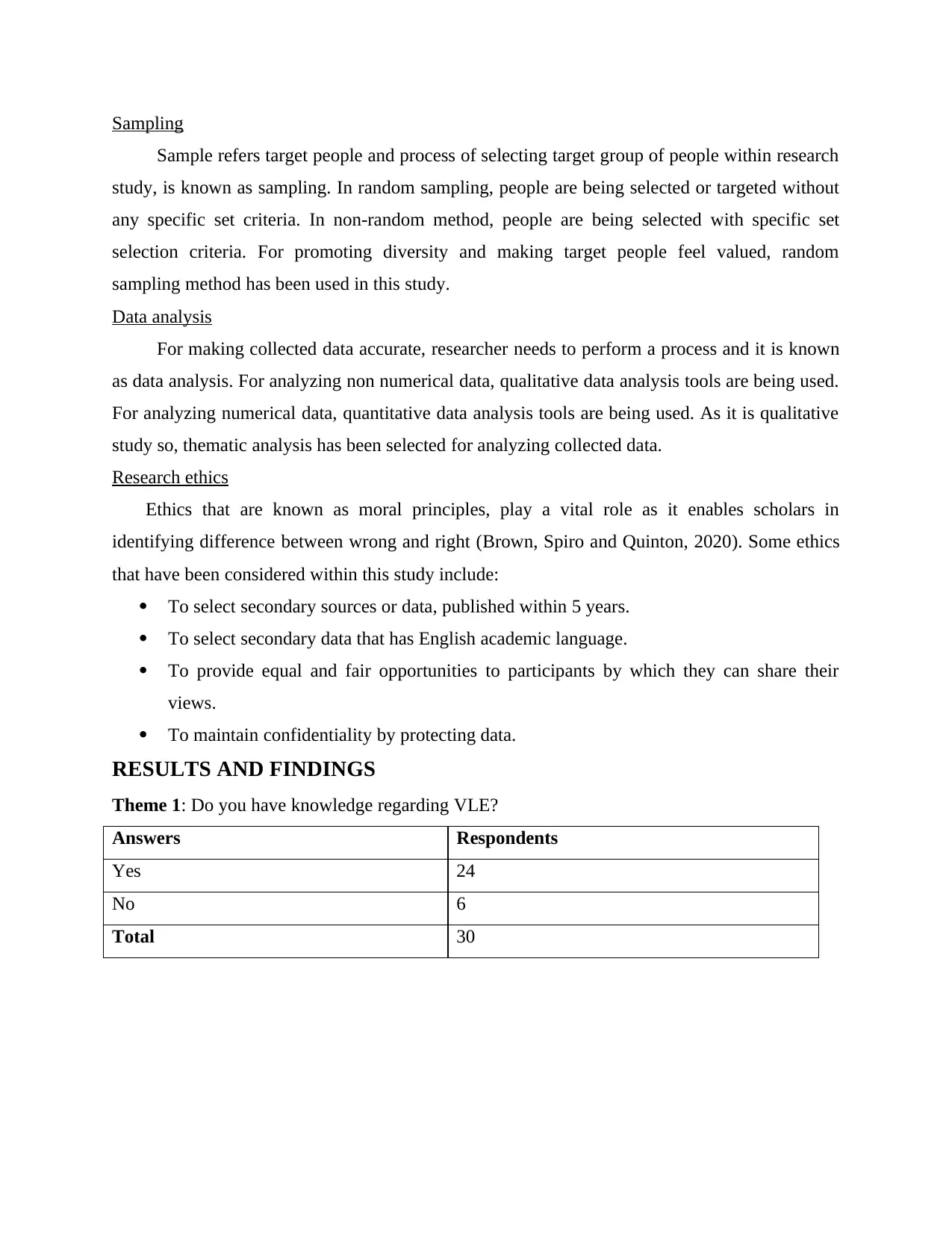
Sampling
Sample refers target people and process of selecting target group of people within research
study, is known as sampling. In random sampling, people are being selected or targeted without
any specific set criteria. In non-random method, people are being selected with specific set
selection criteria. For promoting diversity and making target people feel valued, random
sampling method has been used in this study.
Data analysis
For making collected data accurate, researcher needs to perform a process and it is known
as data analysis. For analyzing non numerical data, qualitative data analysis tools are being used.
For analyzing numerical data, quantitative data analysis tools are being used. As it is qualitative
study so, thematic analysis has been selected for analyzing collected data.
Research ethics
Ethics that are known as moral principles, play a vital role as it enables scholars in
identifying difference between wrong and right (Brown, Spiro and Quinton, 2020). Some ethics
that have been considered within this study include:
To select secondary sources or data, published within 5 years.
To select secondary data that has English academic language.
To provide equal and fair opportunities to participants by which they can share their
views.
To maintain confidentiality by protecting data.
RESULTS AND FINDINGS
Theme 1: Do you have knowledge regarding VLE?
Answers Respondents
Yes 24
No 6
Total 30
Sample refers target people and process of selecting target group of people within research
study, is known as sampling. In random sampling, people are being selected or targeted without
any specific set criteria. In non-random method, people are being selected with specific set
selection criteria. For promoting diversity and making target people feel valued, random
sampling method has been used in this study.
Data analysis
For making collected data accurate, researcher needs to perform a process and it is known
as data analysis. For analyzing non numerical data, qualitative data analysis tools are being used.
For analyzing numerical data, quantitative data analysis tools are being used. As it is qualitative
study so, thematic analysis has been selected for analyzing collected data.
Research ethics
Ethics that are known as moral principles, play a vital role as it enables scholars in
identifying difference between wrong and right (Brown, Spiro and Quinton, 2020). Some ethics
that have been considered within this study include:
To select secondary sources or data, published within 5 years.
To select secondary data that has English academic language.
To provide equal and fair opportunities to participants by which they can share their
views.
To maintain confidentiality by protecting data.
RESULTS AND FINDINGS
Theme 1: Do you have knowledge regarding VLE?
Answers Respondents
Yes 24
No 6
Total 30
⊘ This is a preview!⊘
Do you want full access?
Subscribe today to unlock all pages.

Trusted by 1+ million students worldwide
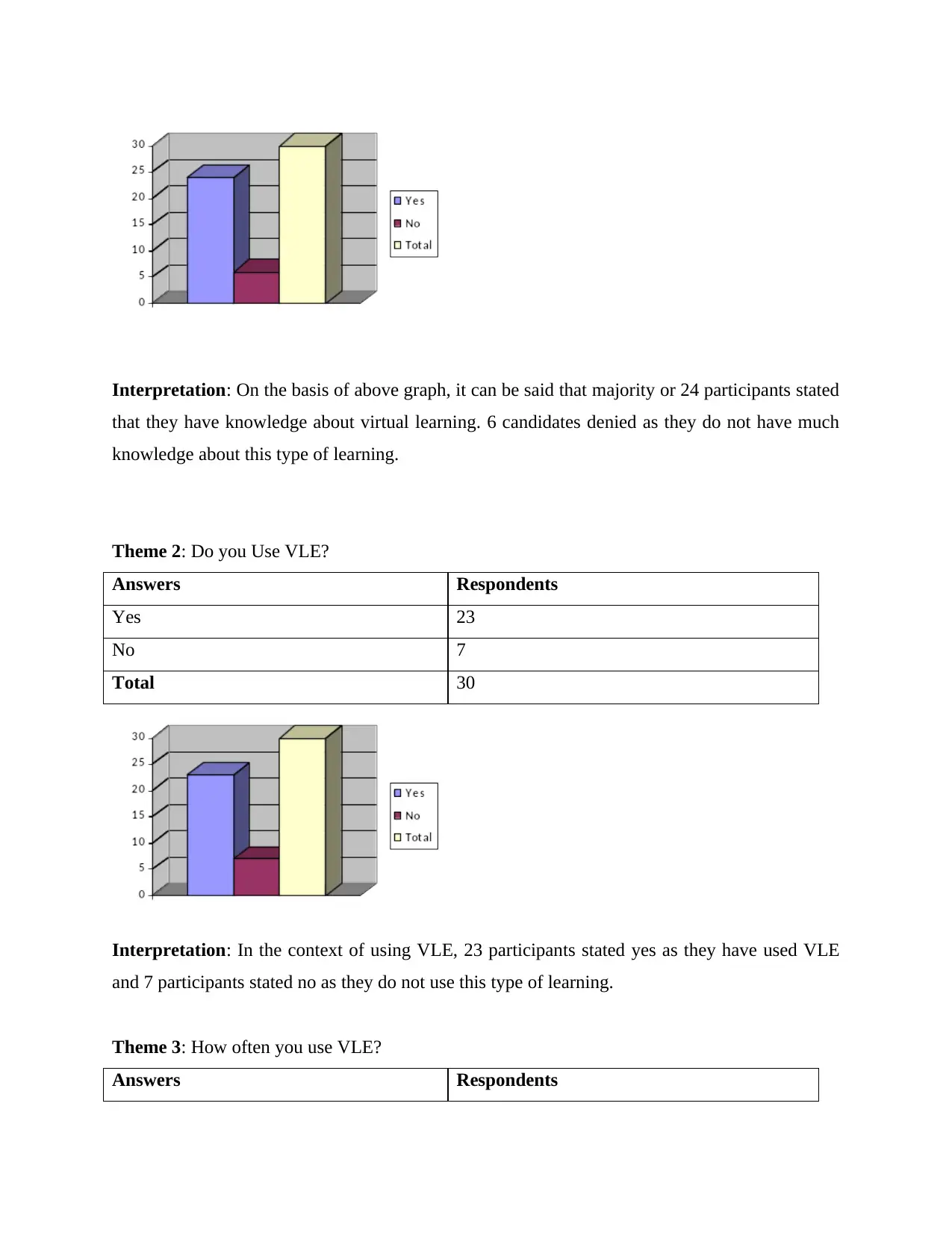
Interpretation: On the basis of above graph, it can be said that majority or 24 participants stated
that they have knowledge about virtual learning. 6 candidates denied as they do not have much
knowledge about this type of learning.
Theme 2: Do you Use VLE?
Answers Respondents
Yes 23
No 7
Total 30
Interpretation: In the context of using VLE, 23 participants stated yes as they have used VLE
and 7 participants stated no as they do not use this type of learning.
Theme 3: How often you use VLE?
Answers Respondents
that they have knowledge about virtual learning. 6 candidates denied as they do not have much
knowledge about this type of learning.
Theme 2: Do you Use VLE?
Answers Respondents
Yes 23
No 7
Total 30
Interpretation: In the context of using VLE, 23 participants stated yes as they have used VLE
and 7 participants stated no as they do not use this type of learning.
Theme 3: How often you use VLE?
Answers Respondents
Paraphrase This Document
Need a fresh take? Get an instant paraphrase of this document with our AI Paraphraser
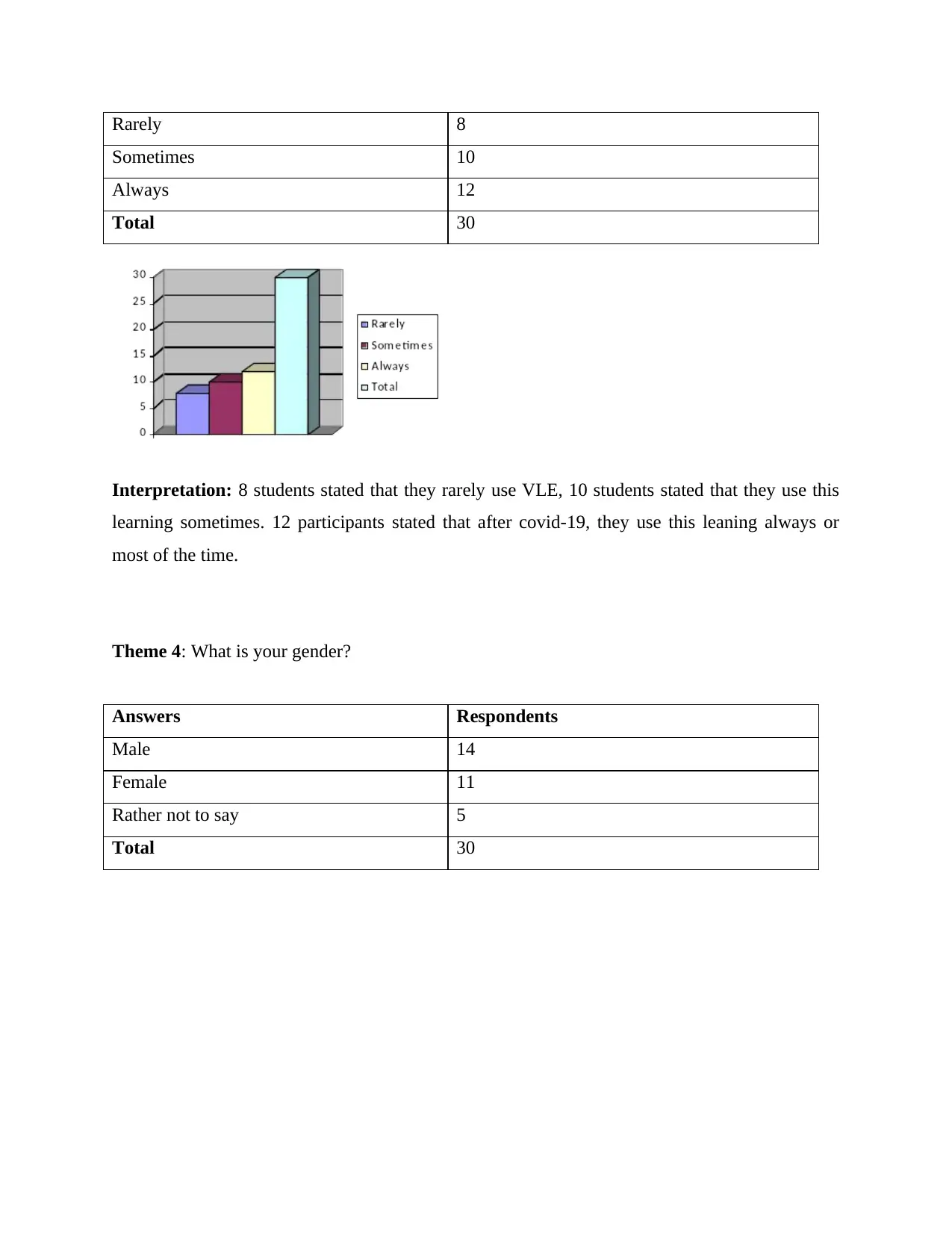
Rarely 8
Sometimes 10
Always 12
Total 30
Interpretation: 8 students stated that they rarely use VLE, 10 students stated that they use this
learning sometimes. 12 participants stated that after covid-19, they use this leaning always or
most of the time.
Theme 4: What is your gender?
Answers Respondents
Male 14
Female 11
Rather not to say 5
Total 30
Sometimes 10
Always 12
Total 30
Interpretation: 8 students stated that they rarely use VLE, 10 students stated that they use this
learning sometimes. 12 participants stated that after covid-19, they use this leaning always or
most of the time.
Theme 4: What is your gender?
Answers Respondents
Male 14
Female 11
Rather not to say 5
Total 30
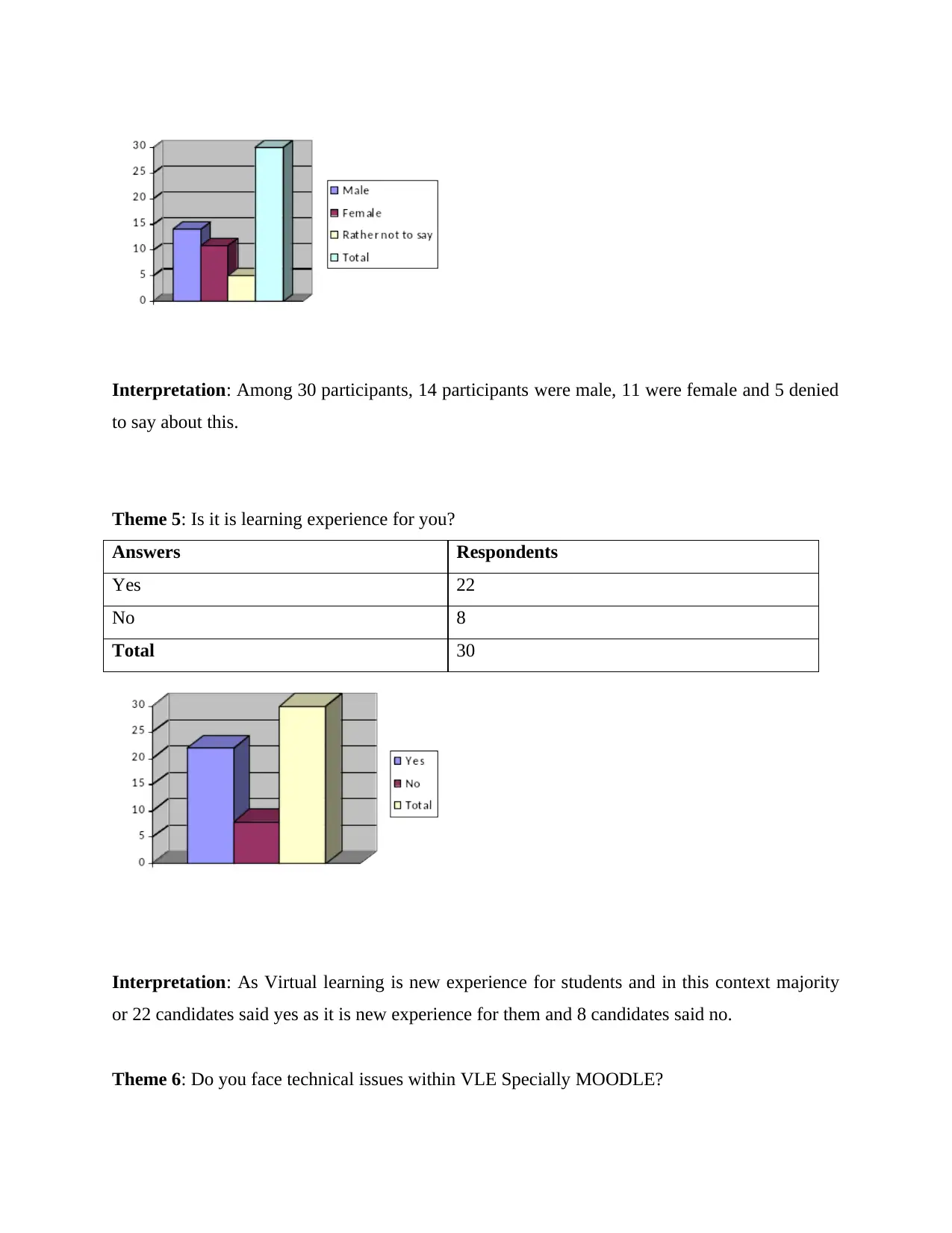
Interpretation: Among 30 participants, 14 participants were male, 11 were female and 5 denied
to say about this.
Theme 5: Is it is learning experience for you?
Answers Respondents
Yes 22
No 8
Total 30
Interpretation: As Virtual learning is new experience for students and in this context majority
or 22 candidates said yes as it is new experience for them and 8 candidates said no.
Theme 6: Do you face technical issues within VLE Specially MOODLE?
to say about this.
Theme 5: Is it is learning experience for you?
Answers Respondents
Yes 22
No 8
Total 30
Interpretation: As Virtual learning is new experience for students and in this context majority
or 22 candidates said yes as it is new experience for them and 8 candidates said no.
Theme 6: Do you face technical issues within VLE Specially MOODLE?
⊘ This is a preview!⊘
Do you want full access?
Subscribe today to unlock all pages.

Trusted by 1+ million students worldwide
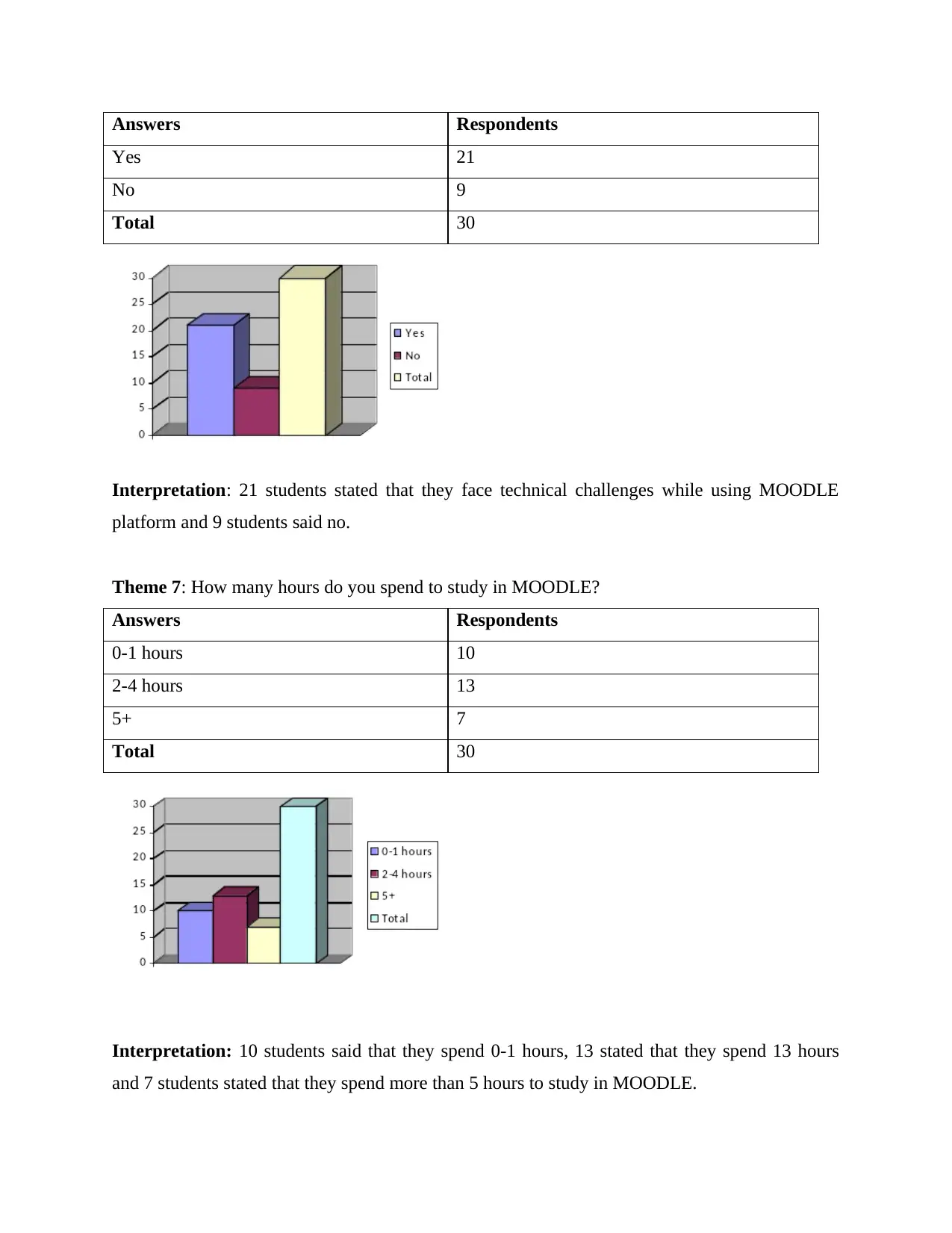
Answers Respondents
Yes 21
No 9
Total 30
Interpretation: 21 students stated that they face technical challenges while using MOODLE
platform and 9 students said no.
Theme 7: How many hours do you spend to study in MOODLE?
Answers Respondents
0-1 hours 10
2-4 hours 13
5+ 7
Total 30
Interpretation: 10 students said that they spend 0-1 hours, 13 stated that they spend 13 hours
and 7 students stated that they spend more than 5 hours to study in MOODLE.
Yes 21
No 9
Total 30
Interpretation: 21 students stated that they face technical challenges while using MOODLE
platform and 9 students said no.
Theme 7: How many hours do you spend to study in MOODLE?
Answers Respondents
0-1 hours 10
2-4 hours 13
5+ 7
Total 30
Interpretation: 10 students said that they spend 0-1 hours, 13 stated that they spend 13 hours
and 7 students stated that they spend more than 5 hours to study in MOODLE.
Paraphrase This Document
Need a fresh take? Get an instant paraphrase of this document with our AI Paraphraser
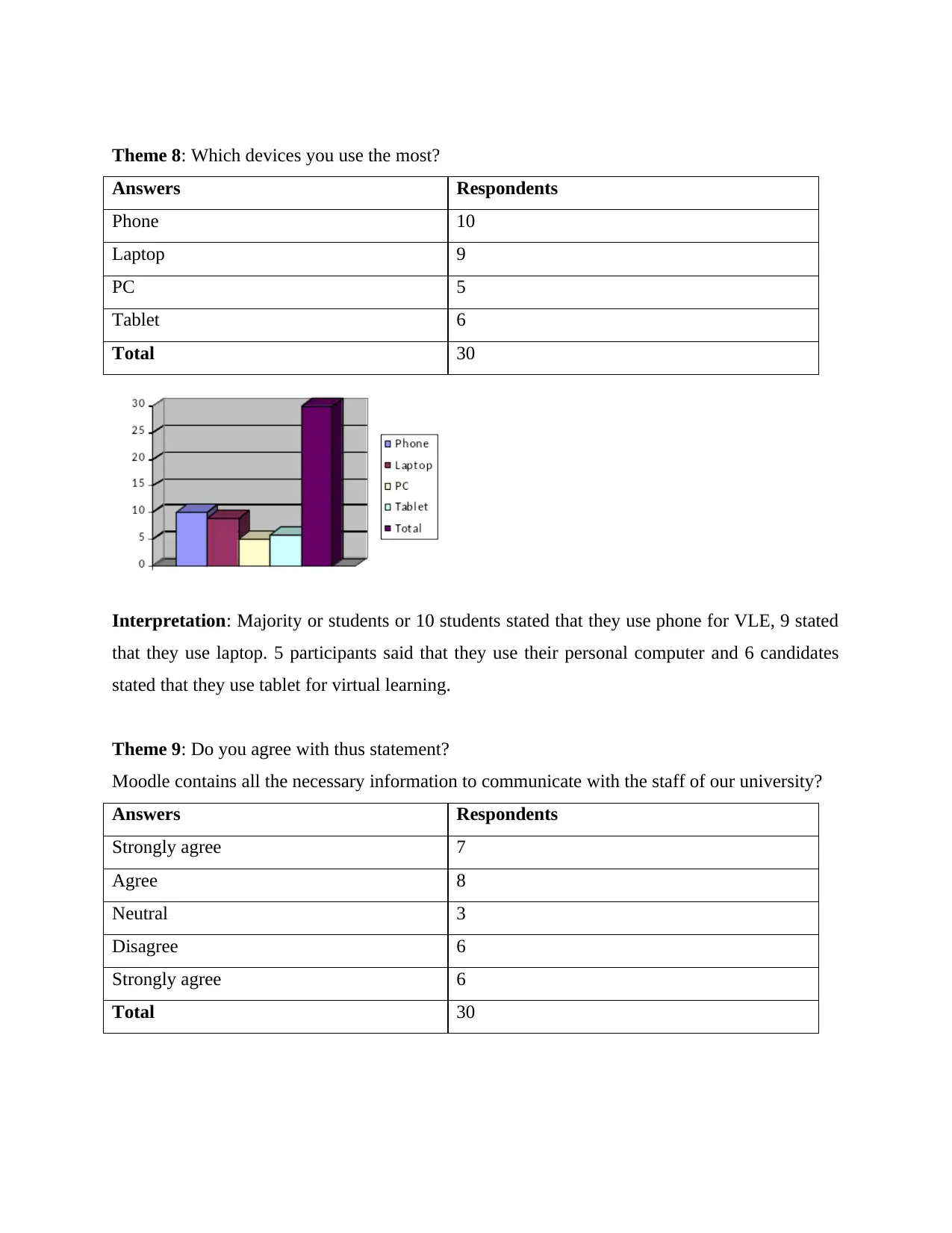
Theme 8: Which devices you use the most?
Answers Respondents
Phone 10
Laptop 9
PC 5
Tablet 6
Total 30
Interpretation: Majority or students or 10 students stated that they use phone for VLE, 9 stated
that they use laptop. 5 participants said that they use their personal computer and 6 candidates
stated that they use tablet for virtual learning.
Theme 9: Do you agree with thus statement?
Moodle contains all the necessary information to communicate with the staff of our university?
Answers Respondents
Strongly agree 7
Agree 8
Neutral 3
Disagree 6
Strongly agree 6
Total 30
Answers Respondents
Phone 10
Laptop 9
PC 5
Tablet 6
Total 30
Interpretation: Majority or students or 10 students stated that they use phone for VLE, 9 stated
that they use laptop. 5 participants said that they use their personal computer and 6 candidates
stated that they use tablet for virtual learning.
Theme 9: Do you agree with thus statement?
Moodle contains all the necessary information to communicate with the staff of our university?
Answers Respondents
Strongly agree 7
Agree 8
Neutral 3
Disagree 6
Strongly agree 6
Total 30
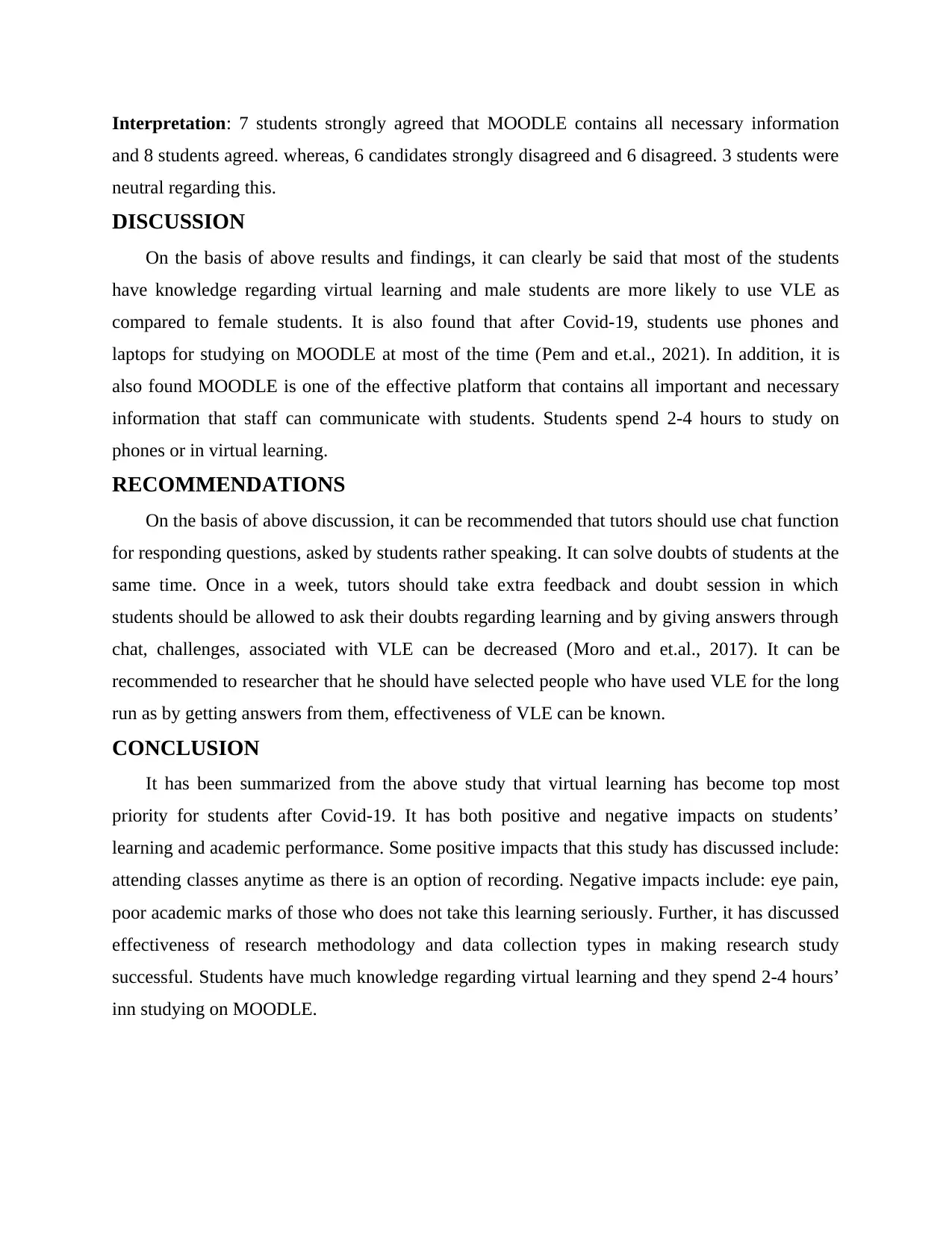
Interpretation: 7 students strongly agreed that MOODLE contains all necessary information
and 8 students agreed. whereas, 6 candidates strongly disagreed and 6 disagreed. 3 students were
neutral regarding this.
DISCUSSION
On the basis of above results and findings, it can clearly be said that most of the students
have knowledge regarding virtual learning and male students are more likely to use VLE as
compared to female students. It is also found that after Covid-19, students use phones and
laptops for studying on MOODLE at most of the time (Pem and et.al., 2021). In addition, it is
also found MOODLE is one of the effective platform that contains all important and necessary
information that staff can communicate with students. Students spend 2-4 hours to study on
phones or in virtual learning.
RECOMMENDATIONS
On the basis of above discussion, it can be recommended that tutors should use chat function
for responding questions, asked by students rather speaking. It can solve doubts of students at the
same time. Once in a week, tutors should take extra feedback and doubt session in which
students should be allowed to ask their doubts regarding learning and by giving answers through
chat, challenges, associated with VLE can be decreased (Moro and et.al., 2017). It can be
recommended to researcher that he should have selected people who have used VLE for the long
run as by getting answers from them, effectiveness of VLE can be known.
CONCLUSION
It has been summarized from the above study that virtual learning has become top most
priority for students after Covid-19. It has both positive and negative impacts on students’
learning and academic performance. Some positive impacts that this study has discussed include:
attending classes anytime as there is an option of recording. Negative impacts include: eye pain,
poor academic marks of those who does not take this learning seriously. Further, it has discussed
effectiveness of research methodology and data collection types in making research study
successful. Students have much knowledge regarding virtual learning and they spend 2-4 hours’
inn studying on MOODLE.
and 8 students agreed. whereas, 6 candidates strongly disagreed and 6 disagreed. 3 students were
neutral regarding this.
DISCUSSION
On the basis of above results and findings, it can clearly be said that most of the students
have knowledge regarding virtual learning and male students are more likely to use VLE as
compared to female students. It is also found that after Covid-19, students use phones and
laptops for studying on MOODLE at most of the time (Pem and et.al., 2021). In addition, it is
also found MOODLE is one of the effective platform that contains all important and necessary
information that staff can communicate with students. Students spend 2-4 hours to study on
phones or in virtual learning.
RECOMMENDATIONS
On the basis of above discussion, it can be recommended that tutors should use chat function
for responding questions, asked by students rather speaking. It can solve doubts of students at the
same time. Once in a week, tutors should take extra feedback and doubt session in which
students should be allowed to ask their doubts regarding learning and by giving answers through
chat, challenges, associated with VLE can be decreased (Moro and et.al., 2017). It can be
recommended to researcher that he should have selected people who have used VLE for the long
run as by getting answers from them, effectiveness of VLE can be known.
CONCLUSION
It has been summarized from the above study that virtual learning has become top most
priority for students after Covid-19. It has both positive and negative impacts on students’
learning and academic performance. Some positive impacts that this study has discussed include:
attending classes anytime as there is an option of recording. Negative impacts include: eye pain,
poor academic marks of those who does not take this learning seriously. Further, it has discussed
effectiveness of research methodology and data collection types in making research study
successful. Students have much knowledge regarding virtual learning and they spend 2-4 hours’
inn studying on MOODLE.
⊘ This is a preview!⊘
Do you want full access?
Subscribe today to unlock all pages.

Trusted by 1+ million students worldwide
1 out of 15
Related Documents
Your All-in-One AI-Powered Toolkit for Academic Success.
+13062052269
info@desklib.com
Available 24*7 on WhatsApp / Email
![[object Object]](/_next/static/media/star-bottom.7253800d.svg)
Unlock your academic potential
Copyright © 2020–2026 A2Z Services. All Rights Reserved. Developed and managed by ZUCOL.



